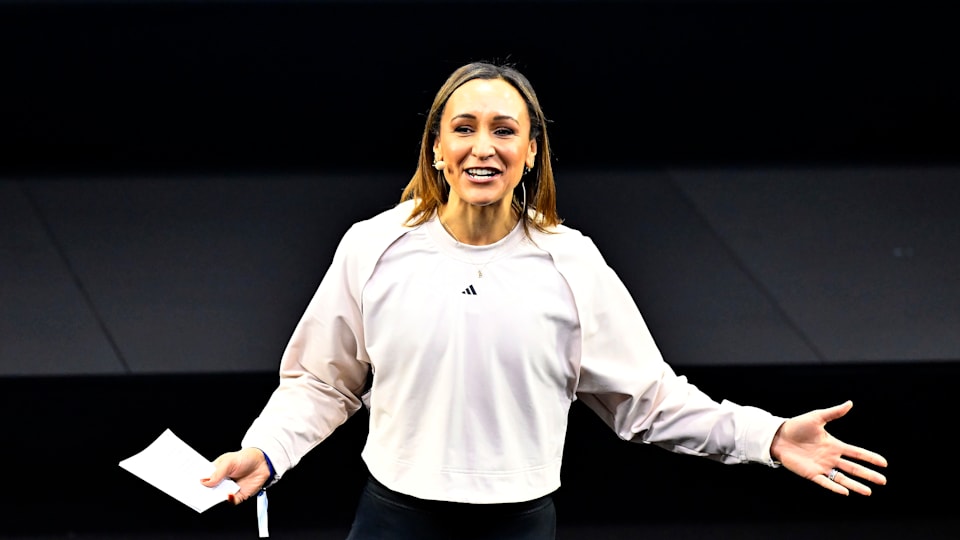
Talent, dedication, sacrifice, and opportunity. These are some of the key prerequisites for success in any field. But without confidence, the rest could become obsolete.
Just ask former heptathlon ace Jessica Ennis-Hill who, believe it or not, felt totally out of place in a gym as a youth because she ‘didn’t know what to do’.
However, after building up expertise through playing sports, her self-belief grew. The Brit sees this confidence as the bedrock of her ultra-successful athletics career, which includes three world titles, an Olympic gold medal at London 2012, and silver at Rio 2016.
“Sport has completely shaped who I am. It's given me the confidence and belief to take on challenges I perhaps wouldn't have done if I didn't find myself in sport from a young age. It’s taught me about discipline, focus, and having structure,” Ennis-Hill told Olympics.com ahead of Paris 2024.
“I think grassroots and community level sports are hugely important and make a huge difference not only the way you feel physically, but mentally. It can help you find the focus you need within your world.”
Jessica Ennis-Hill on using sport to tackle challenges in life
Retirement is a scary thought for any athlete, regardless of their achievements.
This is due to a combination of a loss of identity, and potentially the loss of community and direction.
But when Ennis-Hill hung up her spikes at 30 after winning silver at Rio 2016, she did so without fearing for the future.
Her confidence in taking on new challenges enabled the Sheffield-born star to find fulfilment in becoming an entrepreneur.
In this way, she wants to help other women develop confidence, enabling them to flourish in whichever arena of life they choose.
“It's not just about trying to climb your way to elite sport. It's how you bring people together and how you give them skills through sport that they can use in different areas of their lives, particularly when they're facing challenges,” she continued.
“I've been able to develop and grow and learn skills which I took into my later life and retirement.
“It means the transition into retirement has been good to me. I've enjoyed embracing different sides of life and having different opportunities.” - Jessica Ennis-Hill to Olympics.com
Jessica ENNIS-HILL
Despite no longer being an elite athlete, Ennis-Hill continues to feel a huge benefit in practising sports.
Even after completing hundreds of kilometres of training during her career, running is still her go-to activity for gaining peace of mind.
“I still love running. For me, it’s a big part of physically staying active, but also mentally having that headspace to go out by myself and switch off. And I love circuits and a bit of weights too for the variety of exercise.”
After taking the 2014 season off to give birth, Ennis-Hill returned to win silver at Rio 2016.
This moment, combined with her overall experience as an elite female athlete, convinced the heptathlete that more needed to be done to support women in sport.
After retiring, the former British national record holder launched an app-based training programme and partnered with the Ladies European Tour in golf to create a product that helped women map their training to their menstrual cycle.
“I went through my own journey having my son within sport and learning about me as an athlete, but also myself as a woman, and how your body changes so much. And I think that's something that's not spoken about enough,” she said.
“How can we put more research into understanding how we can help more athletes to make those marginal gains and to stand in their bodies and understand the hormones in a better way?” - Jessica Ennis-Hill to Olympics.com.
Growth of women's sport at Paris 2024
Another former athletics star who returned to competition after giving birth, Allyson Felix, is also helping to support athlete mothers.
The seven-time Olympic gold medallist from the US helped create a first-of-its-kind nursery at the Olympic Village in Paris to give parents a quiet space to gather and look after infants.
“There was nothing like that when I was competing. If you wanted to have your children at a training camp, you had to do it somewhere else rather than in the team set-up,” Ennis-Hill said.
These health initiatives, combined with scheduling changes to the Paris 2024 programme, demonstrate the increased support of women’s sport at the Games.
The women’s basketball final was the final sporting event and in a change of tradition, the winners of the women’s marathon were presented with their medals at the Closing Ceremony instead of the men.
“How significant is that? I think it's brilliant. I think the female voice that's really coming out within women's sport is so great to see.
“I think there's some incredible female athletes and there's been some great performances over the years, and I think we really want to shout outs about it. I think ending the games that way, is really, really special and a big, big change.”
